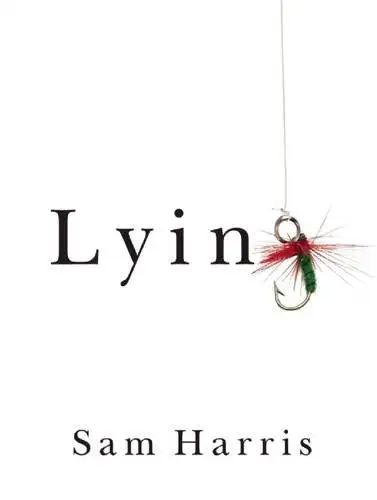
Lying
By Sam Harris
Length: 108 pages
Rating: 9.5/10
First Published: 2011
This book is about not lying and living a more honest life. It is full of advice and real-world examples on how to do that.
I believe society would be better off if we all tried to incorporate even some of the teachings in the book.
Why I read it: Heard great things about it and like Sam Harris.
Notes
I’m a big fan of Sam Harris, he’s a really eloquent speaker, with a soothing, tranquil voice, who doesn’t take himself too seriously. Truly remarkable guests have also come on his podcast, give yourself a favour and brighten up a mundane activity with the Stephen Fry episode.
I really want to give it 5 stars, but there are important scenarios where I wanted him to provide answers.
-
How to be truthful when “the system is broken?” When lying avoids nonsensical red tape but you know the truth doesn’t.
-
When not lying will get you in an endless, sterile argument; how to balance “telling the truth” with “being mindful of your time?”
James Clear addressed the latter in his newsletter. That’s exactly the kind of answer I wanted in the book. Here’s his take on it:
‘You’re probably right’ has become one of my favorite phrases.
Whenever someone disagrees with you on a small matter (read: most things), you can shrug, say ‘you’re probably right’ and move on.
Not caring about winning trivial arguments saves so much time and energy.
— James Clear
Highlights
What Is a Lie?
My words would, in a narrow sense, be true—but the statement seems calculated to deceive. Would I be lying? Close enough.
It is in believing one thing while intending to communicate another that every lie is born.
The one lied to almost never shares this view.
Tactical silences. Note: I’m guilty of this
Many of us will be unable to get safely into our beds tonight without having told several lies over the course of the day. Note: Very useful exercise
To lie is to intentionally mislead others when they expect honest communication.
A person may be impeccably truthful while being mistaken. Note: Not deliberate lie
People lie so that others will form beliefs that are not true. The more consequential the beliefs—that is, the more a person’s well-being depends upon a correct understanding of the world—the more consequential the lie.
The Mirror of Honesty
Honest people are a refuge: You know they mean what they say; you know they will not say one thing to your face and another behind your back;
To cancel plans, decline invitations, critique others’ work, etc., all while being honest about what one is thinking and feeling.
Lying is the lifeblood of addiction.
In committing to be honest with everyone, we commit to avoiding a wide range of long-term problems, but at the cost of occasional, short-term discomfort.
Two Types of Lies
White Lies
With white lies, exceptions to the principle of honesty begin to multiply.
I would rather be maladroit, or even rude, than dishonest.
Perhaps she does look fat in that dress, but it’s the fault of the dress
Sam receiving a gift he doesn’t like 👇 “Do you like it?” “You know, I’m really touched you thought of me. But I don’t think I can pull this off. My style is somewhere between boring and very boring.”
Why not simply reassure someone with a tiny lie and send her out into the world feeling more confident? Because she is fat.
A white lie is simply a denial of reality. It is a refusal to offer honest guidance in a storm.
Lying seems a clear failure of friendship.
honesty demands that we communicate any uncertainty we may feel about the relevance of our own opinions.
Unless someone is suicidal or otherwise on the brink, deciding how much they can know about themselves seems the quintessence of arrogance.
Trust
she lied so effortlessly and persuasively that Jessica was left wondering
What do our children learn about us in moments like these? Is this really the example we want to set for them?
Faint Praise
Honest feedback could have spared me an immense amount of wasted effort.
Those who are not their friends are bound to notice these same flaws Note: Better you hear it from me.
Secrets
The truth could well be, “I’d rather not say.” So there is no conflict, in principle, between honesty and the keeping of secrets.
Lies in Extremis
A willingness to be honest—especially about truths that one might be expected to conceal—often leads to much more gratifying exchanges with other human beings.
Unjust laws: They tempt peaceful and (otherwise) honest people to lie so as to avoid being punished for behavior that is ethically blameless.
Mental Accounting
One of the greatest problems for the liar is that he must keep track of his lies. Note: Brain cycles
When you tell the truth, you have nothing to keep track of.
You can even reconsider certain facts and honestly change your views. And you can openly discuss your confusion.
And all these stresses accrue, whether or not anyone discovers that he has been lying.
For reasons that they might be unable to pinpoint, people cannot trust you. You will begin to seem like someone who is always dancing around the facts—because you most certainly are.
Big Lies
We seem to be predisposed to remember statements as true even after they have been disconfirmed.
The moment one begins dropping bombs, or destroying a country’s infrastructure with cyber-attacks, lying has become just another weapon in the arsenal.
The ethics of war and espionage are the ethics of emergency—and are, therefore, necessarily limited in scope.
Conclusion
By lying to one person, we potentially spread falsehoods to many others.
How would your relationships change if you resolved never to lie again?
Highlights, covers, art and quotes are copyright to their respective authors.